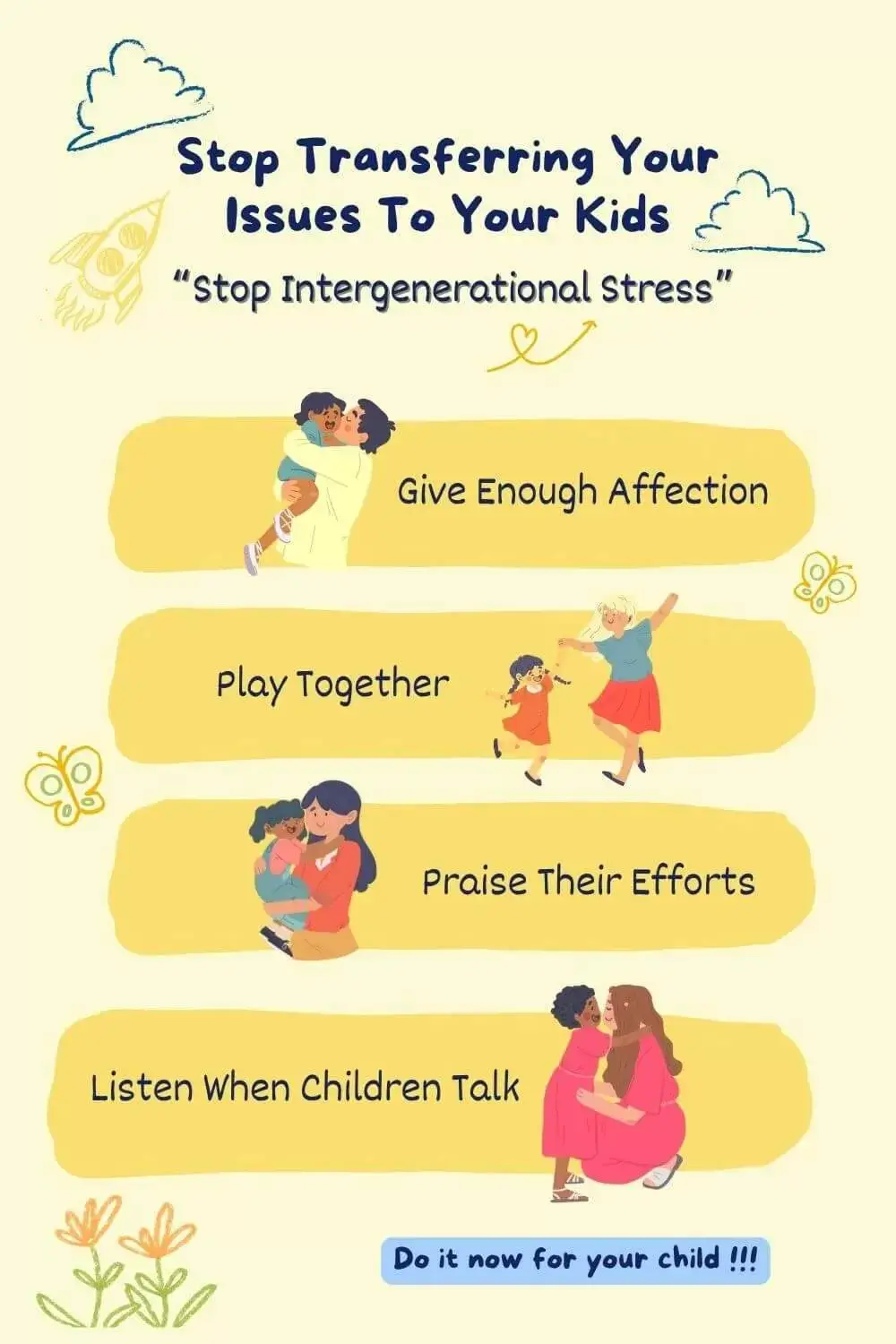Today's Tuesday • 8 mins read
— By Dr. Sandip Roy.
I once met a family of nail-biters. In the half-hour that I consulted the younger son, the other son, mother, and father had all chewed at their fingernails at least once.
A stressed parent’s unresolved issues can make their children jittery and anxious, who can then transfer the stressful behavior to the next generation.
This stress, that trauma survivor parents pass down to the next generation, is called intergenerational stress.
You may have passed down some of your stress to your children. Learn to recognize this unseen legacy, protect their future, and help them grow up happy.
Of course, childhood stress can have long-term effects on a child’s mental and physical health.
Takeaway Messages
- Rooted in Trauma: Intergenerational stress originates from traumatic experiences or chronic stress in previous generations.
- Family Transmission: This stress is passed to subsequent generations, either genetically or through learned family behaviors.
- Future Impact: It affects the emotional and psychological well-being of children, influencing their future health, relationships, and success.

How To Stop Intergenerational Stress In Children
Breaking the cycle of intergenerational stress involves learning healthy coping mechanisms as a family. These include:
1. Give Nurturing Physical Contact.
We instinctively know that a mother’s behavior toward her baby can alter the baby’s stress levels. Science proves it.
Sharp & Pickles (2012) found that how often a mother stroked her baby in the early weeks after birth affected how the baby’s body reacted to stress, particularly when the mother has depression.
A depressed mother during pregnancy can increase the baby’s stress levels and negative emotionality, but only if the mother does not stroke the baby often.
The study suggests that frequent, comforting physical contact by a distressed mother can relax her baby’s physiology and emotional reactivity.
So, to stop a mother’s stress from being transmitted to her baby, encourage her to gently stroke the baby.
2. Foster Open Communication.
Schedule open communication sessions weekly between all the family members. Keep the atmosphere relaxed by avoiding digital devices and adding some snacks.
Families that openly share their experiences, emotions, and stories have stronger relationships and more resilient mental well-being.
Talking without conditions, listening intently, showing compassion, and asserting yourself gently are some ways to facilitate open dialogue.
Make sure that they have psychological safety at all times, especially during stressful times.
Encourage your children to express their feelings and emotions without fear. They must know that you will listen to them without interrupting or stopping them.
3. Teach Them About Stress.
Help your kids understand stress so they can avoid its long-term effects — like bottling up their difficult emotions and reacting with aggression — to prevent its transfer down the generations.
Educate them that all stress is not bad. And how they can use good stress to improve their performance and handle bad stress without losing control.
Train them in techniques like deep breathing, progressive muscle relaxation, and problem-solving skills.
More crucially, empower your children to see themselves as someone capable of coping with stress.
4. Do Mindfulness and Relaxation Together.
Mindfulness, the practice of being present and fully engaged in the moment without judgment, helps children recognize and break patterns of inherited stress.
Relaxation techniques like deep breathing, yoga, or guided imagery soothe physical tension and mental anxiety.
Incorporating these into family routines can help manage individual stress as well as foster a calmer family environment.
And reduce the transmission of stressful behavior patterns across family members and from one generation to the next.

5. Practice Positive Parenting Behaviors.
Some positive parenting practices to help children break intergenerational stress transmission:
- Create a safe and nurturing environment: Provide a space where children feel safe, loved, and cared for. This is crucial for offsetting stress and helping children develop resilience.
- Foster positive family relationships: Strengthen bonds with family members through shared activities, laughter, and support. This can help children feel more secure and better equipped to handle stress.
- Give Enough Attention: Paying focused attention to your children conveys that they are valued and important. It can involve setting aside uninterrupted time each day to listen, talk, or simply be present with your child, which can significantly reduce feelings of stress and isolation.
- Listen When Children Talk: Actively listening to your children when they want to talk shows that you value their thoughts and feelings. It involves giving them your full attention, making eye contact, and responding in a way that validates their experiences. This can help children feel supported and understood, reducing stress and building trust.
- Play Together: Engaging in play with your children not only strengthens your bond but also serves as a stress relief for both of you. Whether it’s building a puzzle, having a pretend tea party, or playing a board game, shared playtime can teach children healthy ways to manage stress while also nurturing their creativity and social skills.
- Praise Their Efforts: Acknowledge and celebrate your child’s efforts, not just their accomplishments. This practice builds their self-esteem and resilience, making them more likely to approach challenges with a positive attitude. Praise the process of their work, such as their determination, strategy, or persistence, which encourages a growth mindset.
- Promote physical activity: Encourage activities like playing games, dancing, or sports that can help release endorphins and promote a feeling of well-being.
- Prioritize self-care within the family: Each family member is entitled to take time out for themselves, to do activities that relax them and make them feel good. Self-care may involve spending time on a hobby, self-introspection, spa or massage, meditation, or time with a friend.

6. Seek social support
“It takes a village,” as we all know.
Reach out to friends, family, or support groups to share your experiences and challenges.
See it as creating a community that understands and supports each other to break the cycle of stress, offering different perspectives and coping practical strategies.
7. Professional Support
If you’re dealing with intergenerational stress, therapy can be an invaluable resource. Therapists are equipped to help you work through inherited trauma response patterns and can teach effective coping strategies for when triggers arise.
Research On Intergenerational Stress Transfer
Intergenerational stress starts from parental trauma that has caused long-lived and widespread stress.
Children of highly stressed or traumatized parents are more likely to go through psychosocial stress, high anxiety, low self-esteem, inhibition of aggression, hypervigilance, physical health problems, and behavioral and emotional issues.
Researchers have recorded children of such trauma survivors describe their own feelings of helplessness, second-hand traumatization through the stories told by parents, and the pressure of compensating for parental losses and damage (Spiegelman, 1991).
The Dutch Famine study first suggested that parental stress can be transmitted through sperm or ova (Barker, 1998). It was supported by Franklin et al. (2010), Dias and Ressler (2014), and Gapp et al. (2014).
Studies also prove that inducing stress in pups (by temporarily removing and handling their mothers before returning them) changes the pups’ neural, hormonal, cognitive, and behavioral responses (Liu et al., 1997; Caldji et al., 1998; Weaver et al., 2004).
Summary
- “Intergenerational stress” or “transgenerational stress” refers to stress transmitted within families from one generation to the next.
- Traumatized parents often do not recover after stress exposure and may develop anxiety, depression, or post-traumatic stress disorder (PTSD). They may pass on this unresolved stress to their children through genes or social learning.
- To stop your children from ‘learning’ to react to their surroundings with stress, give enough love to your children, play together, praise their efforts, listen when your children talk, and create a safe home environment.
Further Reading:
- Intergenerational memory of the holocaust
- Intergenerational Transmission of Stress in Humans
- Intergenerational trauma in refugee families: a systematic review
- Prenatal maternal stress and offspring aggressive behavior: Intergenerational and transgenerational inheritance
- Intergenerational adaptations to stress are evolutionarily conserved, stress-specific, and have deleterious trade-offs
- The intergenerational effects of Indian Residential Schools: Implications for the concept of historical trauma
- Biological underpinnings of trauma and post-traumatic stress disorder: focusing on genetics and epigenetics
- Intergenerational transmission and prevention of adverse childhood experiences (ACEs)
Final Words
Stop Transferring Your Stress To Your Kids and Protect Them From Intergenerational Stress.
Please know that you’re not alone in this journey, and seeking professional help is a strongly positive step towards healing. Seek therapy or counseling to address and process your unresolved trauma.
Remember, there’s no shame in reaching out for support when you need it.
√ Also Read:
- 10 Unsettling Signs of Repressed Childhood Trauma In Adults
- How To Remember Repressed Childhood Trauma Memories?
- How Childhood Stress Affects Mental Health In Adults?
- How To Help Your Child Cope With Stress?
√ Please spread the word if you found this helpful.
• Our Story!
